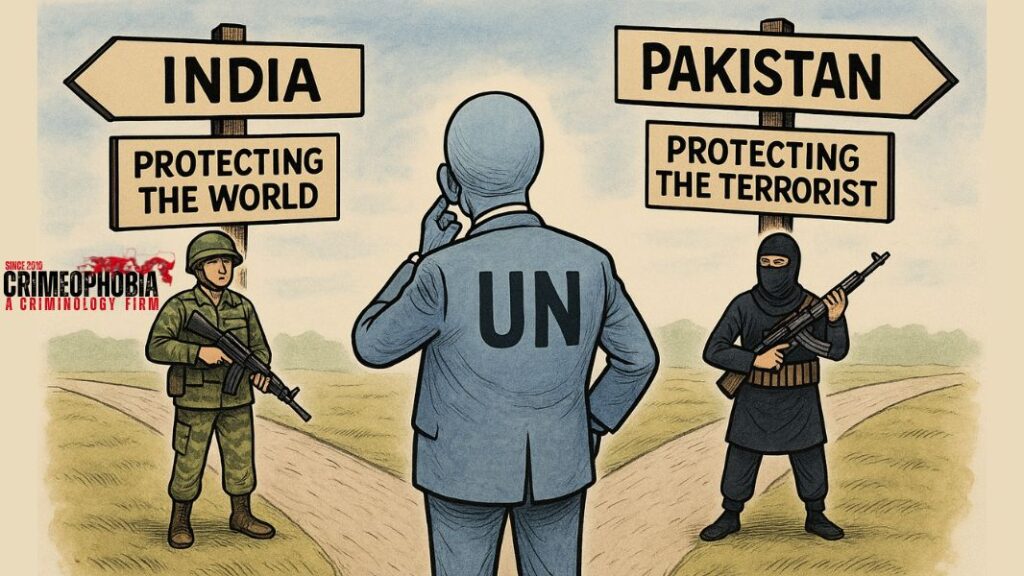
India’s Civilian Voice Challenges UN Bias: Criminologist Snehil Dhall yet again Confronts UNODC Over Pakistan Favouritism at Pre-Middle East Informal Meeting
International Bureau: As the United Nations prepares for another high-profile international event on crime prevention and criminal justice in the Middle East, Indian civilian and founder of Crimeophobia, Criminologist Snehil Dhall, has stirred diplomatic waters by directly challenging what he calls the UN’s “systemic bias against India” in favour of Pakistan.
In an informal pre-event expert meeting held on June 18, 2025, Dhall confronted senior officials from the United Nations Office on Drugs and Crime (UNODC), urging them to acknowledge India’s leadership in the implementation of the United Nations Convention against Transnational Organized Crime (UNTOC). He reminded the global body that Crimeophobia, the pioneering criminology firm from India, has been actively advancing the goals of UNTOC for over 12 years, independently contributing to crime prevention and criminal justice reforms both nationally and transnationally.
Despite Dhall’s assertive claims and documentation of India’s contributions, the UNODC representative reportedly responded with vague assurances, stating they would “look into it.” Dhall alleged that these delays are part of a broader diplomatic pattern, wherein Pakistan is repeatedly promoted on international platforms under what he described as “diplomatic favour-trading” — a practice he believes compromises the integrity of the UN’s objectives. “There is a clear diplomatic tilt,” said Dhall. “UNODC has been advertising Pakistan for work it has never done, while India’s civilian-led initiatives remain sidelined. This is not only unjust but dangerous in today’s volatile global diplomatic climate.”
Previously, in a bold demand, he called for the removal of key UN officials, including the UN Human Rights Chief, citing alleged involvement in orchestrating a coup in Bangladesh, based on a confession aired on BBC, which, according to Dhall, indicates the Chief’s indirect responsibility for the genocide of Hindus in Bangladesh and the massive cross-border infiltration of civilians and terrorists into India. He also pushed for Pakistan’s disqualification from any upcoming UNSC Presidency — highlighting its internal instability and misuse of international platforms.
As the Middle East meeting draws closer, these confrontations have created significant ripples within diplomatic and civil society circles. Observers suggest this could mark a paradigm shift in civilian diplomacy, where independent subject experts like Dhall are no longer just participants, but are now actively shaping the international discourse. India’s civil society, particularly through initiatives like Crimeophobia, has been instrumental in influencing national and international crime prevention strategies, often stepping in where governments are slow or constrained. With wars, violent extremism, and organized crime continuing to escalate globally, Dhall warned that a Third World War scenario is already unfolding in multiple regions, and the UN’s failure to act impartially is only deepening global insecurity.
The broader concern, echoed by several experts attending the informal session, is whether the UN still holds credibility as a peacekeeper and neutral platform for global collaboration. Dhall’s confrontation may have been informal in format, but its substance is formally disrupting the established norms of diplomacy. According to Dhall, the diplomatic immunity and impunity enjoyed by UN officials have allowed several transnational crimes to flourish, particularly across South Asia. He alleged that the UN Human Rights Chief had been actively involved in legitimizing narratives that downplayed Islamist extremism in Bangladesh, while failing to act against the targeted killings, rapes, temple destructions, and forced conversions of Hindus — incidents well-documented by both local and international civil society organizations, but curiously absent from official UN reports.
Crimeophobia, which has been spearheading India’s UNTOC mission independently for over a decade, has submitted multiple dossiers to both Indian and international authorities, highlighting these critical security lapses. As India prepares to strengthen its presence at the Middle East meeting, the diplomatic community awaits with bated breath — will the United Nations finally acknowledge India’s long-standing contributions, or will Dhall’s voice become a rallying cry for larger civil resistance against global bias, as a few UN officials continue to show favouritism towards a terrorist nation like Pakistan — a policy that threatens global security?
